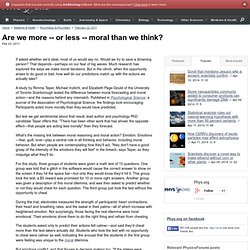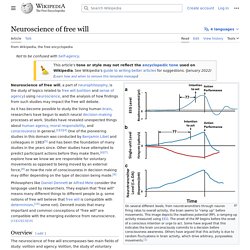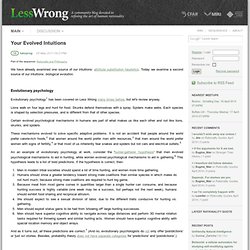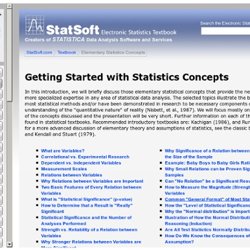

Depression Statistics From Around The Globe.
Top 10 Unethical Psychological Experiments - Top 10 Lists. Humans Psychology is a relatively new science which gained popularity in the early 20th century with Wilhelm Wundt.

In the zeal to learn about the human thought process and behavior, many early psychiatrists went too far with their experimentations, leading to stringent ethics codes and standards. Though these are highly unethical experiments, it should be mentioned that they did pave the way to induct our current ethical standards of experiments, and that should be seen as a positive. There is some crossover on this list with the Top 10 Evil Human Experiments.
Three items from that list are reproduced here (items 8, 9, and 10) for the sake of completeness. The Monster Study The Monster Study was a stuttering experiment on 22 orphan children in Davenport, Iowa, in 1939 conducted by Wendell Johnson at the University of Iowa. The Aversion Project 1970s and 1980s Dr. Stanford Prison Experiment Dr. Monkey Drug Trials Landis’ Facial Expressions Experiment Learned Helplessness. Moral than we think? If asked whether we'd steal, most of us would say no.

Would we try to save a drowning person? That depends—perhaps on our fear of big waves. Much research has explored the ways we make moral decisions. But in the clinch, when the opportunity arises to do good or bad, how well do our predictions match up with the actions we actually take? A study by Rimma Teper, Michael Inzlicht, and Elizabeth Page-Gould of the University of Toronto Scarborough tested the difference between moral forecasting and moral action—and the reasons behind any mismatch.
But lest we get sentimental about that result, lead author and psychology PhD candidate Teper offers this: "There has been other work that has shown the opposite effect—that people are acting less morally" than they forecast. What's the missing link between moral reasoning and moral action? For this study, three groups of students were given a math test of 15 questions.
Is Shyness an Evolutionary Tactic? Depressive realism. Evidence for[edit] Evidence against[edit] When asked to rate both their performance and the performance of another, non-depressed individuals demonstrated positive bias when rating themselves but no bias when rating others.

Criticism of the evidence[edit] Psychological ("personality") Types. Psychological ("personality") Types According to Jung's theory of Psychological Types we are all different in fundamental ways.

One's ability to process different information is limited by their particular type. These types are sixteen. People can be either Extroverts or Introverts, depending on the direction of their activity ; Thinking, Feeling, Sensing, Intuitive, according to their own information pathways; Judging or Perceiving, depending on the method in which they process received information. Extroverts vs. Extroverts are directed towards the objective world whereas Introverts are directed towards the subjective world. Sensing vs. How Social Media Help Introverted Kids. The Top 10 Psychology Studies of 2010. The end of 2010 fast approaches, and I'm thrilled to have been asked by the editors of Psychology Today to write about the Top 10 psychology studies of the year.
I've focused on studies that I personally feel stand out, not only as examples of great science, but even more importantly, as examples of how the science of psychology can improve our lives. Each study has a clear "take home" message, offering the reader an insight or a simple strategy they can use to reach their goals , strengthen their relationships, make better decisions, or become happier. The Science of Why We Don't Believe Science. Illustration: Jonathon Rosen "A MAN WITH A CONVICTION is a hard man to change.

Tell him you disagree and he turns away. Show him facts or figures and he questions your sources. Appeal to logic and he fails to see your point. " Forer effect. A related and more general phenomenon is that of subjective validation.[1] Subjective validation occurs when two unrelated or even random events are perceived to be related because a belief, expectation, or hypothesis demands a relationship.

Thus people seek a correspondence between their perception of their personality and the contents of a horoscope. Forer's demonstration[edit] On average, the students rated its accuracy as 4.26 on a scale of 0 (very poor) to 5 (excellent). Only after the ratings were turned in was it revealed that each student had received an identical sketch assembled by Forer from a newsstand astrology book.[2] The sketch contains statements that are vague and general enough to most people.
In another study examining the Forer effect, students took the MMPI personality assessment and researchers evaluated their responses. The Forer effect is also known as the "Barnum effect". Repeating the study[edit] Variables influencing the effect[edit] Recent research[edit] Neuroscience of free will.
Neuroscience of free will is the part of neurophilosophy that studies the interconnections between free will and neuroscience.

As it has become possible to study the living brain, researchers have begun to watch decision making processes at work. Fallacy of composition. The fallacy of composition arises when one infers that something is true of the whole from the fact that it is true of some part of the whole (or even of every proper part).

For example: "This fragment of metal cannot be fractured with a hammer, therefore the machine of which it is a part cannot be fractured with a hammer. " This is clearly fallacious, because many machines can be broken apart, without any of those parts being able to be fractured. This fallacy is often confused with the fallacy of hasty generalization, in which an unwarranted inference is made from a statement about a sample to a statement about the population from which it is drawn. Boost Your Brainstorm Effectiveness with the Why Habit. If you’re stuck trying to find ways to achieve a goal or solve a problem, there’s a quick analysis tool that can put you back in perspective and save you hours of frustrated brainstorming. Einstein’s Secret to Amazing Problem Solving (and 10 Specific Ways You Can Use It)
Einstein is quoted as having said that if he had one hour to save the world he would spend fifty-five minutes defining the problem and only five minutes finding the solution. This quote does illustrate an important point: before jumping right into solving a problem, we should step back and invest time and effort to improve our understanding of it. Here are 10 strategies you can use to see problems from many different perspectives and master what is the most important step in problem solving: clearly defining the problem in the first place! The Problem Is To Know What the Problem Is The definition of the problem will be the focal point of all your problem-solving efforts.
As such, it makes sense to devote as much attention and dedication to problem definition as possible. Problem Definition Tools and Strategies The good news is that getting different perspectives and angles in order to clearly define a problem is a skill that can be learned and developed. 1. Top 10 Thinking Traps Exposed. Our minds set up many traps for us. Unless we’re aware of them, these traps can seriously hinder our ability to think rationally, leading us to bad reasoning and making stupid decisions.
Features of our minds that are meant to help us may, eventually, get us into trouble. Here are the first 5 of the most harmful of these traps and how to avoid each one of them. 1. Your Evolved Intuitions. Part of the sequence: Rationality and Philosophy We have already examined one source of our intuitions: attribute substitution heuristics.

Today we examine a second source of our intuitions: biological evolution. Evolutionary psychology. Elementary Concepts in Statistics. In this introduction, we will briefly discuss those elementary statistical concepts that provide the necessary foundations for more specialized expertise in any area of statistical data analysis.

The selected topics illustrate the basic assumptions of most statistical methods and/or have been demonstrated in research to be necessary components of our general understanding of the "quantitative nature" of reality (Nisbett, et al., 1987). We will focus mostly on the functional aspects of the concepts discussed and the presentation will be very short. Pyschology Tests & Surveys. Sheet-for-Emotions.jpg from psychcentral.com - StumbleUpon.
Eight Ways to Spot Emotional Manipulation. The Ten Most Revealing Psych Experiments. Psychology is the study of the human mind and mental processes in relation to human behaviors - human nature. Due to its subject matter, psychology is not considered a 'hard' science, even though psychologists do experiment and publish their findings in respected journals.
Top 10 Common Faults In Human Thought. Humans. 7 stupid thinking errors you probably make. The brain isn’t a flawless piece of machinery. Although it is powerful and comes in an easy to carry container, it has it’s weaknesses. A field in psychology which studies these errors, known as biases. DISTORTED THINKING. 15 Styles of Distorted Thinking. 12 Critical Things You Should Never Tolerate. Eight Ways to Spot Emotional Manipulation. 15 Things You Probably Didn’t Know About the Brain. 5 Psychological Experiments That Prove Humanity is Doomed. 5 Logical Fallacies That Make You Wrong More Than You Think. Top 10 Thinking Traps Exposed. 47 Mind-Blowing Psychology-Proven Facts You Should Know About Yourself.
WHAT YOU ARE ABOUT TO READ IN THE NEXT PARAGRAPH IS COMMONLY BELIEVED, BUT NOT TRUE – You read by recognizing the shapes of words and groups of words. Words that are in all capital letters all have the same shape: a rectangle of a certain size. 38 Ways To Win An Argument—Arthur Schopenhauer - The India Uncut Blog - India Uncut. Top 10 Conversation Hacks. 47 Mind-Blowing Psychology-Proven Facts You Should Know About Yourself - StumbleUpon. How to Detect Lies - body language, reactions, speech patterns. Body Language Basics - Syncrat Publishing. What Does Your Body Language Say About You? How To Read Signs and Recognize Gestures - Jinxi Boo - Jinxi Boo.
Body Language Signals: Eye Directions, Pupils. Eye movements reveal unconscious memory retrieval : Neurophilosophy. How to Read Someone’s Mind. How to tell in 15 minutes whether someone likes you - by Bridget Webber. 10 Practical Uses For Psychological Research in Everyday Life. Psychology studies relevant to everyday life - PsyBlog. 10 Brilliant Social Psychology Studies. 10 More Brilliant Social Psychology Studies: Why Smart People Do.
How to Live With an Unknowable Mind. Body Language at Work by Peter Clayton. Gestures and Body Language Tutorial.